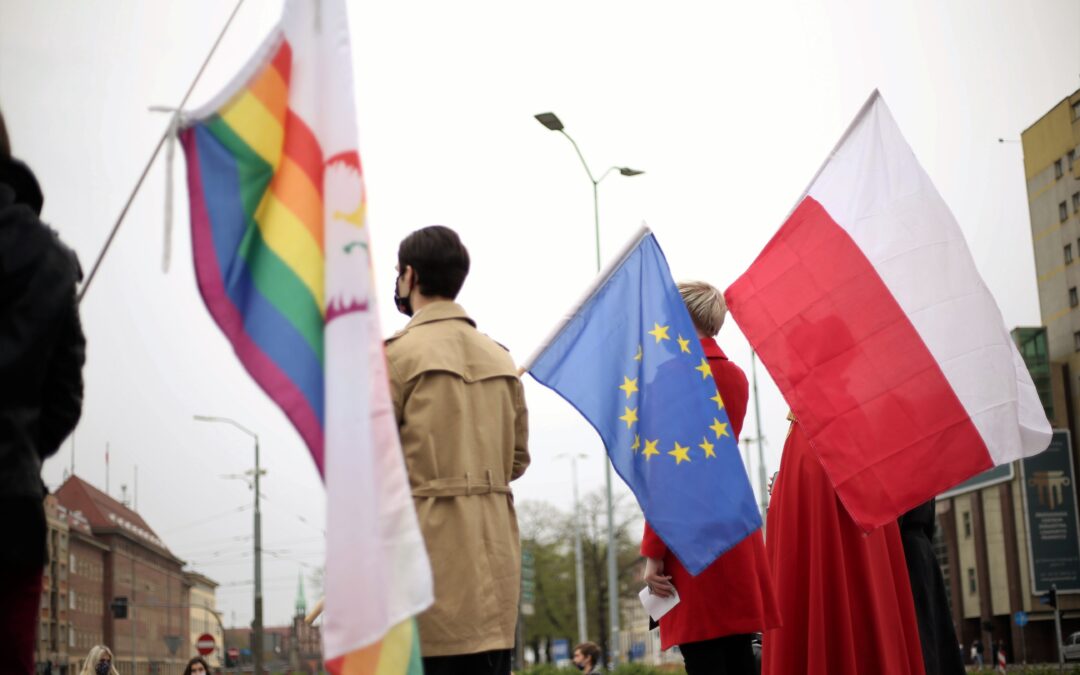The European Commission has today started legal action against Poland and Hungary over their “violation of fundamental rights of LGBTIQ people”, which it argues contravenes European Union values and laws.
The national-conservative authorities in both countries have recently engaged in a vocal anti-LGBT campaign. This has included a recent law in Hungary banning the “promotion” of homosexuality to minors as well as a number of local authorities in Poland declaring themselves “free from LGBT ideology”.
Jarosław Kaczyński, the chairman of Poland’s ruling Law and Justice (PiS), has described “LGBT ideology” as an “imported movement” that “threatens our identity, our nation, its continued existence, and therefore the Polish state”.
“Equality and the respect for dignity and human rights are core values of the EU, enshrined in Article 2 of the Treaty of the European Union,” said the European Commission today, promising to “use all the instruments at its disposal to defend these values”.
It argues that Poland and Hungary have violated these rights and values through their various measures, including the recent Hungarian law, which “violates a number of EU rules”, and the Polish “LGBT-ideology free zones”.
The latter “may violate EU law regarding non-discrimination on the grounds of sexual orientation”, said the commission, which noted that, despite a request for information on the issue from Poland in February, the Polish authorities have so far failed to properly comply.
“Poland is thus hampering the Commission’s ability to exercise its powers vested under the Treaties and failing to comply with the principle of sincere cooperation under Article 4(3) TEU, which requires Member States to provide genuine cooperation to the Union’s institutions,” it added.
The commission has given Poland and Hungary two months to respond to its arguments, after which the case could be referred to the Court of Justice of the European Union, the bloc’s highest legal authority.
Its statement also included a quotation from the commission’s president, Ursula von der Leyen, saying that “Europe will never allow parts of our society to be stigmatised: be it because of whom they love, because of their age, their ethnicity, their political opinions, or their religious beliefs”.
Europa nigdy nie pozwoli na napiętnowanie części naszego społeczeństwa. Rozpoczynamy działania prawne przeciwko Polsce 🇵🇱 i Węgrom 🇭🇺 za naruszenie podstawowych praw osób #LGBTIQ.
Władze polskie nie ustosunkowały się w pełni do zapytania KE dotyczącego stref wolnych od LGBT. 🏳️🌈
— Komisja Europejska (@EUinPL) July 15, 2021
In response to today’s announcement by the commission, former PiS foreign minister, and now MEP, Witold Waszczykowski accused Brussels of mounting “an ideological battle against the government in Poland” with the “clear and transparent” aim of making it “collapse”.
He argued that EU action against Poland on a variety of issues – including rule of law and climate – in reality have nothing to do with those issues, but are simply “attacks on our country” aimed at “stigmatising the Polish government” and “reducing foreign investment in Poland”.
“We showed an alternative; we pointed out that Europe is not doomed to neo-Marxism and genderism and that in today’s world one can also rely on traditional conservative values,” and that is why Poland is being targeted by “left-liberal” forces, Waszczykowski told TVP.
Last year, the European Commission began to take action against the Polish local authorities – mostly under PiS control – that have passed anti-LGBT resolutions. It rejected applications for funding from six such municipalities because they failed to “respect EU values and fundamental rights”.
In response, Poland’s justice ministry stepped in to provide three times as much funding to one of the districts, saying that it would always stand up for those “harassed by the European Commission for ideological reasons”.
Earlier this year, a resolution passed by an overwhelming majority in the European Parliament declared the entire European Union to be an “LGBTIQ Freedom Zone”, as a riposte to Poland’s anti-LGBT resolutions.
Separately, Norway, which is not an EU member state, announced that local authorities which have passed anti-LGBT resolutions will not receive money from the grants the country provides to support civil society, the justice system, social inclusion, innovation and other causes.
In response, some Polish municipalities have begun to withdraw their resolutions in fear of losing out on the money. Last month, the acting US ambassador to Poland also warned that the country is losing billions of dollars a year due to discrimination against LGBT people.
The government has, however, continued its anti-LGBT rhetoric. In June, the education minister, Przemysław Czarnek, condemned LGBT pride parades for “promoting deviancy” and said that that those who do so “do not have the same rights” as “normal people”.
Main image credit: Cezary Aszkielowicz / Agencja Gazeta

Daniel Tilles is editor-in-chief of Notes from Poland. He has written on Polish affairs for a wide range of publications, including Foreign Policy, POLITICO Europe, EUobserver and Dziennik Gazeta Prawna.




















